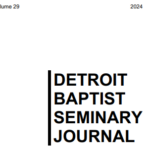“Christ in All the Scriptures”?
The fact that all truth is interconnected and sourced in the Triune God means that God in Christ may be rightly connected to every datum of truth in the whole universe. Many argue that faithful preaching, in fact, will make such a connection in every sermon: the faithful preacher will explicitly identify, in every pericope of Scripture, conceptual links to God in Christ as Creator-Lord-Savior-Judge-King. This argument is plausible, but is beyond the scope of this blog post.
Instead, my goal is to address the narrower idea, held by some, that Christ is to be discovered in every single verse of Scripture using a vast network of prophecies, allusions, patterns, echoes, types, and sundry other rhetorical devices. This theory often finds its basis in a careless reading of Luke 24:27:
Beginning with Moses and all the Prophets, he explained to them what was said in all the Scriptures concerning himself (NIV; cf. NKJV).
or
Beginning with Moses and with all the prophets, He explained to them the things concerning Himself in all the Scriptures (NASB; cf. HCSB, ESV).
In truth, both these translations can be charitably read synonymously, but the ordering of the first translation lends itself more easily to the idea that Jesus iteratively identified every OT Bible verse that spoke directly of himself; while the second translation lends to the suggestion that Jesus discovered, in each and every Bible verse, information about himself.
What’s the difference, you ask? Well, suppose I were to ask you on a Bible content test to identify everything that is said in all the Scriptures about Jonah. You would rightly include (1) a narrative reference in 2 Kings 14:25; (2) the whole book of Jonah; and (3) several references to the “sign of Jonah” in Matthew 12, 16; and Luke 11. You would get full credit for your answer.
But if I instead asked you to find things concerning Jonah in all the Scriptures, you might possibly read this to mean I want you to discover something in every verse of Scripture that connects to the Jonah story. And so you might answer something like this: “In the beginning God created the heavens (from which he spoke to Jonah) and the earth (where Jonah lived or poss. the land to which he was sent by God). Jonah went toward the sea, a motif that emanates darkness and confusion—but one, nonetheless, in which the sovereignty of God still manifested through his ‘hovering’ Spirit. The darkness closed in around Jonah—not only metaphorically, but literally—when he was cast into the sea and swallowed by the whale; however, when Jonah prayed for deliverance, God immediately released Jonah from this darkness with a speech-act that echoed God’s primitive statement, ‘Let there be light!’” And in this way you would work through every verse of the Bible. You fail the test, because you reach the time limit before you can finish.
Sounds silly, right? Yes, it is (though it’s actually rather easy to do and kinda fun). But when exegetes start doing this kind of thing with our Lord Christ, the exercise develops an ominous twist. Artfully conceived, this kind of exegesis can evoke in the hermeneutically naïve a spine-tingling sort of rapture that says, “Wow, I never saw that before! Mysterious! Amazing! Let’s do that again!!” And it’s easy to get drunk on this wide-eyed rapture. But, sadly, in so doing, the work of exegesis reduces to almost as much nonsense about our Lord Christ as I just invented about Jonah. And it can cripple your hearers spiritually.
In sum, please do discover in Scripture all the things concerning Christ, but do not find things concerning Christ directly in every verse of Scripture. Your credibility depends on your successful discernment of the two.




This is just excellent! What’s more it is hilarious!
Thanks Mark!
RLW
Yup!
Thx, Mark
PK